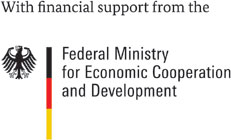Ibrahim Matovu is an adult educator/facilitator of the Kibisi ‘Obwavu Mpologoma’ Integrated Community Learning for Wealth Creation (ICOLEW) Group.
How did you become an adult educator?
Ibrahim Matovu: I was nominated alongside one other nominee through a village meeting convened by the Community Development Officer (CDO) of our Sub-County. The meeting introduced the ICOLEW programme in our village and was looking for a potential candidate to be recruited as an adult educator. To be nominated you needed to be a resident of the village, have good moral standards and possess a Uganda Certificate of Education (Ordinary Level). We went through interviews, and I was successful perhaps because of my prior voluntary engagements with adult learning. We were trained for three weeks by DVV International and the Ministry of Gender, Labour and Social Development. We then mobilised learners and started facilitating learning.
Please describe your current work.
Ibrahim Matovu: The Kibisi ICOLEW Group is composed of 30 learners (24 women and six men). These learners are categorised into three levels (2, 3 and 4), based on the Literacy Assessment and Monitoring Programme (LAMP Scale). I conduct two-hourly learning sessions for two days a week. Learning in ICOLEW is based on the REFLECT methodology where the learning process revolves around finding solutions to problems affecting my community and taking collective actions. Ideas for facilitating literacy and numeracy skills acquisition are also generated based on the problem under scrutiny. The group constructed a learning shelter where learning takes place. However, I also organise field visits for on-site demonstrational learning on topics related to for example agriculture, health, hygiene or nutrition. In these visits I work closely with government sector experts. I prepare teaching/learning materials based on a localised curriculum, prepare a day’s lesson plan and deliver needs-based learning. My other responsibilities include searching for and linking the group to other development programmes, conducting learner assessment, being a custodian of the group’s documents, preparing and submitting monthly reports to the CDO.
Which is your favourite teaching method, and why?
Ibrahim Matovu: I use a variety of participatory facilitation methods, but my favourite is grouping. This is because in groups, even the less active members of the wider group are able to participate freely. Members share their experiences openly, and I also find it appropriate for facilitating multi-level learning where the more advanced members assist their weaker counterparts.
What motivates you?
Ibrahim Matovu: My motivation comes from seeing learners’ progress in literacy and numeracy competences, and then applying their newly-acquired skills to engage effectively in activities that improve their well-being and personal development. I see all these achievements, and feel that they are a result of my work.
This interview is part of a series of interviews portraying adult educators from all over the world. It will be published in the next issue of Adult Education and Development on “The good adult educator”. The issue will be out in November 2019.






